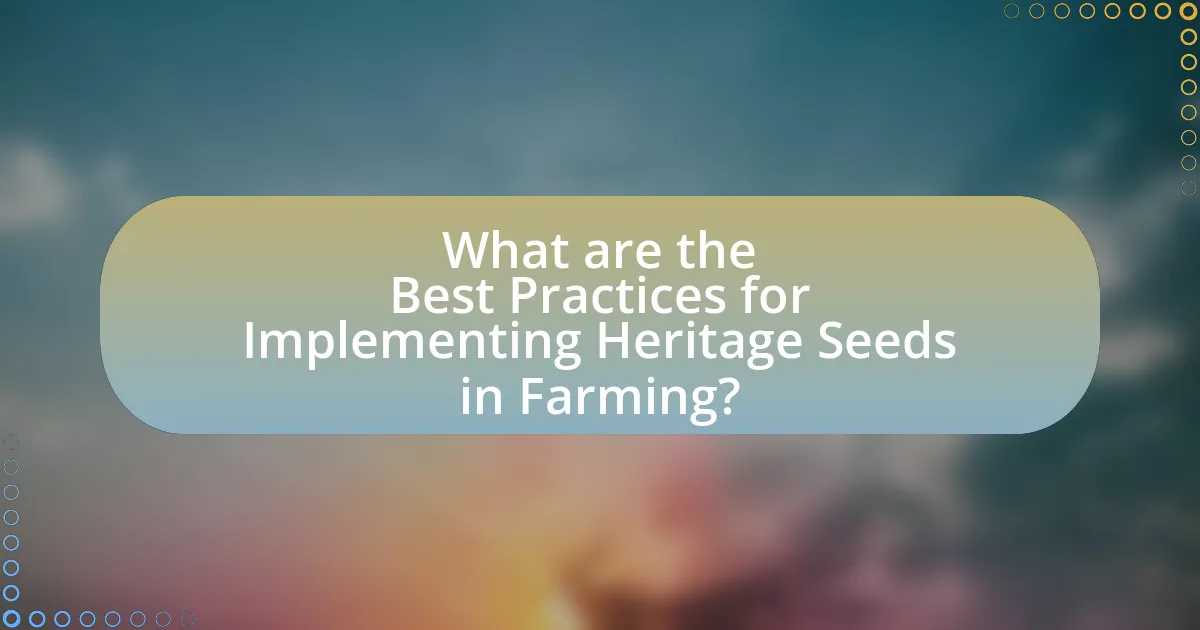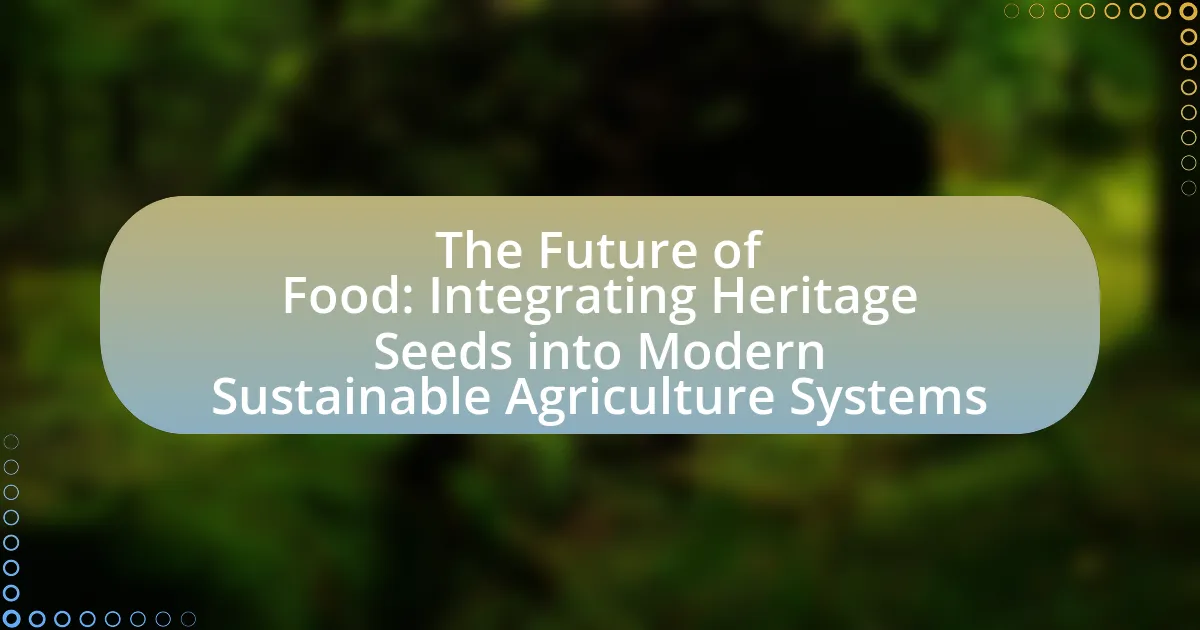Heritage seeds are traditional, open-pollinated varieties that have been cultivated over generations, playing a vital role in preserving biodiversity and supporting sustainable agricultural practices. This article explores the significance of heritage seeds, highlighting their genetic stability, adaptability to local conditions, and unique flavors that enhance food security. It discusses the differences between heritage, hybrid, and GMO seeds, emphasizing the environmental benefits and resilience of heritage varieties. Additionally, the article addresses the importance of educating farmers on heritage seeds, effective teaching methods, and best practices for integrating these seeds into farming systems to promote sustainability and improve crop yields.

What are Heritage Seeds and Why are They Important?
Heritage seeds are traditional varieties of seeds that have been passed down through generations, often cultivated by local farmers and adapted to specific regional conditions. These seeds are important because they contribute to biodiversity, preserve genetic resources, and support sustainable agricultural practices. Heritage seeds are typically open-pollinated, meaning they can be saved and replanted, which promotes self-sufficiency among farmers and reduces reliance on commercial seed companies. Additionally, they often possess unique flavors and nutritional profiles, enhancing food security and resilience in the face of climate change. Studies have shown that maintaining a diverse seed bank can lead to more robust agricultural systems, as evidenced by the work of the Global Crop Diversity Trust, which emphasizes the role of heritage seeds in safeguarding food systems worldwide.
How do Heritage Seeds differ from Hybrid and GMO Seeds?
Heritage seeds differ from hybrid and GMO seeds primarily in their breeding methods and genetic stability. Heritage seeds are open-pollinated varieties that have been passed down through generations, maintaining their genetic traits over time, while hybrid seeds are created through controlled cross-pollination of two different parent plants to produce specific traits, and GMO seeds are genetically modified using biotechnology to introduce new traits that do not occur naturally. Heritage seeds typically offer greater biodiversity and adaptability to local conditions, whereas hybrids may exhibit uniformity and higher yields, and GMOs often focus on pest resistance or herbicide tolerance. The preservation of heritage seeds supports sustainable agriculture by promoting genetic diversity, which is crucial for resilience against pests and climate change.
What characteristics define Heritage Seeds?
Heritage seeds are defined by their open-pollinated nature, which allows them to be naturally pollinated and produce seeds that are true to type in subsequent generations. These seeds are typically heirloom varieties, often passed down through generations, and are known for their genetic diversity, resilience, and adaptability to local growing conditions. Heritage seeds have been cultivated for their flavor, nutritional value, and historical significance, often reflecting the agricultural practices of specific regions. Their preservation is crucial for maintaining biodiversity in agriculture, as they contribute to sustainable farming practices by reducing reliance on hybrid seeds and promoting ecological balance.
Why are Heritage Seeds considered more resilient?
Heritage seeds are considered more resilient because they have been naturally selected over generations for their adaptability to local environments and conditions. This adaptability allows them to withstand pests, diseases, and climate variations more effectively than modern hybrid seeds. Research indicates that heritage varieties often possess a broader genetic diversity, which enhances their ability to cope with environmental stresses. For example, studies have shown that heritage crops can yield better under drought conditions compared to their hybrid counterparts, demonstrating their robustness in challenging climates.
What role do Heritage Seeds play in sustainable agriculture?
Heritage seeds play a crucial role in sustainable agriculture by preserving biodiversity and promoting resilience in farming systems. These seeds, which are open-pollinated and often heirloom varieties, contribute to genetic diversity, allowing crops to adapt to changing environmental conditions and resist pests and diseases. Research indicates that using heritage seeds can enhance soil health and reduce the need for chemical inputs, as these varieties are often more suited to local growing conditions. For example, a study published in the journal “Agriculture, Ecosystems & Environment” highlights that farms utilizing heritage seeds reported improved yields and reduced reliance on synthetic fertilizers, demonstrating their effectiveness in sustainable practices.
How do Heritage Seeds contribute to biodiversity?
Heritage seeds contribute to biodiversity by preserving a wide variety of plant genetic resources that are adapted to local environments. These seeds represent traditional agricultural practices and diverse traits, which enhance ecosystem resilience and adaptability to changing conditions. For instance, heritage seeds can include numerous heirloom varieties of fruits and vegetables, each with unique characteristics that support a diverse gene pool. This genetic diversity is crucial for breeding programs aimed at developing crops that can withstand pests, diseases, and climate change, thereby ensuring food security and ecological balance.
What environmental benefits do Heritage Seeds provide?
Heritage seeds provide significant environmental benefits, including enhanced biodiversity and improved soil health. These seeds contribute to biodiversity by preserving a wide variety of plant genetics, which supports ecosystem resilience and adaptability to changing environmental conditions. Additionally, heritage seeds often require fewer chemical inputs, promoting healthier soil microbiomes and reducing pollution. Studies have shown that diverse cropping systems, which include heritage varieties, can lead to better pest management and reduced reliance on synthetic fertilizers, further supporting sustainable agricultural practices.

How can Educating Farmers on Heritage Seeds Enhance Agricultural Practices?
Educating farmers on heritage seeds can enhance agricultural practices by promoting biodiversity and improving crop resilience. Heritage seeds, which are traditional varieties that have been passed down through generations, often possess unique traits that make them better suited to local climates and conditions. For instance, studies have shown that heritage varieties can be more resistant to pests and diseases, reducing the need for chemical inputs and fostering sustainable farming methods. Additionally, educating farmers about the benefits of these seeds can lead to increased yields and improved soil health, as diverse planting can enhance ecosystem functions. This approach aligns with sustainable agricultural practices, as it encourages the preservation of genetic diversity and supports local food systems.
What educational methods are effective for teaching farmers about Heritage Seeds?
Participatory learning methods are effective for teaching farmers about Heritage Seeds. These methods include hands-on workshops, field demonstrations, and farmer-to-farmer exchanges, which allow farmers to engage directly with the seeds and their cultivation practices. Research indicates that participatory approaches enhance knowledge retention and practical skills, as evidenced by a study published in the Journal of Agricultural Education and Extension, which found that farmers who participated in interactive workshops showed a 40% increase in their understanding of heritage seed benefits compared to traditional lecture-based methods. Additionally, community seed banks and local seed fairs facilitate knowledge sharing and promote the importance of biodiversity, further reinforcing the educational impact on farmers.
How can workshops and hands-on training improve understanding?
Workshops and hands-on training enhance understanding by providing practical experience that reinforces theoretical knowledge. Engaging in interactive activities allows participants to apply concepts in real-world scenarios, leading to deeper comprehension. Research indicates that experiential learning, such as that found in workshops, significantly improves retention rates; for example, studies show that learners retain 75% of what they actively engage with compared to only 5% of what they hear in lectures. This active participation fosters critical thinking and problem-solving skills, essential for farmers to effectively utilize heritage seeds in sustainable agricultural practices.
What resources are available for farmers to learn about Heritage Seeds?
Farmers can access various resources to learn about Heritage Seeds, including agricultural extension services, online courses, and seed-saving organizations. Agricultural extension services provide localized information and support, often offering workshops and seminars focused on Heritage Seeds. Online platforms, such as the Seed Savers Exchange and the USDA’s National Plant Germplasm System, offer educational materials and databases on Heritage Seeds. Additionally, organizations like the Heritage Seed Library provide resources and guidance on seed saving and cultivation practices. These resources are essential for promoting biodiversity and sustainable agricultural practices.
Why is farmer education crucial for the adoption of Heritage Seeds?
Farmer education is crucial for the adoption of Heritage Seeds because it equips farmers with the knowledge and skills necessary to understand the benefits and cultivation practices associated with these seeds. Heritage Seeds often require specific growing conditions and management techniques that differ from conventional seeds, making education essential for successful integration into farming systems. Studies have shown that educated farmers are more likely to adopt sustainable practices, leading to improved crop diversity and resilience, which are key advantages of using Heritage Seeds. For instance, research published in the Journal of Sustainable Agriculture highlights that farmers who received training on Heritage Seed varieties increased their yields by an average of 20% compared to those who did not receive such education. This demonstrates that informed farmers can effectively leverage the unique advantages of Heritage Seeds, ultimately contributing to sustainable agricultural practices.
How does knowledge of Heritage Seeds impact crop yields?
Knowledge of Heritage Seeds significantly enhances crop yields by promoting biodiversity and resilience in agricultural systems. Farmers who understand the unique characteristics and adaptability of Heritage Seeds can select varieties that are better suited to their local environments, leading to improved growth and productivity. Research indicates that Heritage Seeds often possess traits such as drought resistance and pest tolerance, which can result in higher yields under challenging conditions. For instance, a study published in the journal “Agricultural Systems” found that farms utilizing Heritage Seeds experienced yield increases of up to 30% compared to those relying solely on commercial hybrids. This knowledge empowers farmers to make informed decisions that optimize their crop production while supporting sustainable agricultural practices.
What challenges do farmers face in transitioning to Heritage Seeds?
Farmers face several challenges in transitioning to Heritage Seeds, including limited availability, lack of knowledge, and potential yield variability. Limited availability arises because Heritage Seeds are often not produced on a large scale, making them harder to source compared to hybrid seeds. The lack of knowledge pertains to farmers’ unfamiliarity with the cultivation practices specific to Heritage Seeds, which can lead to improper management and lower productivity. Additionally, yield variability can occur as Heritage Seeds may not perform consistently under varying environmental conditions, leading to uncertainty in crop output. These challenges highlight the need for education and support systems to facilitate the transition to Heritage Seeds effectively.

What are the Best Practices for Implementing Heritage Seeds in Farming?
The best practices for implementing heritage seeds in farming include selecting locally adapted varieties, ensuring proper seed saving techniques, and promoting biodiversity. Farmers should choose heritage seeds that are well-suited to their local climate and soil conditions, which enhances resilience and productivity. Proper seed saving techniques, such as isolating different varieties to prevent cross-pollination and maintaining seed purity, are crucial for preserving the genetic integrity of heritage seeds. Additionally, promoting biodiversity by planting a variety of heritage seeds can improve ecosystem health and reduce pest and disease pressures, as supported by studies showing that diverse cropping systems lead to increased yields and sustainability.
How can farmers successfully integrate Heritage Seeds into their existing practices?
Farmers can successfully integrate Heritage Seeds into their existing practices by adopting a diversified planting strategy that combines these seeds with conventional varieties. This approach allows farmers to maintain crop resilience and enhance biodiversity, which is crucial for sustainable agriculture. Research indicates that Heritage Seeds often possess traits such as drought resistance and pest tolerance, which can improve overall yield stability. For instance, a study published in the Journal of Sustainable Agriculture found that farms utilizing a mix of Heritage and modern seeds reported a 20% increase in crop resilience during adverse weather conditions. By gradually incorporating Heritage Seeds into their crop rotation and utilizing organic farming techniques, farmers can also improve soil health and reduce dependency on chemical inputs, further supporting sustainable agricultural practices.
What steps should farmers take to select the right Heritage Seeds?
Farmers should evaluate the climate, soil type, and pest resistance when selecting the right Heritage Seeds. Understanding the specific environmental conditions of their farm allows farmers to choose seeds that are well-suited for their region, enhancing growth and yield. Additionally, selecting seeds with proven pest resistance can reduce the need for chemical interventions, promoting sustainable practices. Research indicates that Heritage Seeds often have better adaptability to local conditions, as they have been cultivated over generations in specific environments, making them a reliable choice for sustainable agriculture.
How can farmers manage soil health when using Heritage Seeds?
Farmers can manage soil health when using Heritage Seeds by implementing crop rotation, cover cropping, and organic amendments. Crop rotation helps break pest and disease cycles, while cover cropping improves soil structure and enhances nutrient availability. Organic amendments, such as compost or manure, enrich the soil with essential nutrients and promote microbial activity. Research indicates that these practices can lead to improved soil fertility and biodiversity, which are crucial for sustainable agriculture. For instance, a study published in the Journal of Soil and Water Conservation found that farms utilizing diverse crop rotations and cover crops experienced a 20% increase in soil organic matter over five years.
What common mistakes should farmers avoid when using Heritage Seeds?
Farmers should avoid several common mistakes when using Heritage Seeds, including neglecting proper seed selection, failing to understand local growing conditions, and not implementing crop rotation practices. Proper seed selection is crucial, as Heritage Seeds are often adapted to specific climates and soil types; using seeds that are not suited for the local environment can lead to poor yields. Understanding local growing conditions, such as soil health and climate variability, is essential for successful cultivation; farmers who overlook these factors may face challenges in plant growth and disease resistance. Additionally, not practicing crop rotation can deplete soil nutrients and increase pest and disease pressure, undermining the benefits of using Heritage Seeds. These mistakes can significantly impact the sustainability and productivity of agricultural practices.
How can farmers ensure proper seed storage and preservation?
Farmers can ensure proper seed storage and preservation by maintaining optimal conditions such as low humidity, cool temperatures, and protection from light. Specifically, seeds should be stored in airtight containers to prevent moisture absorption, ideally in a cool, dark place with temperatures between 32°F and 41°F (0°C to 5°C). Research indicates that seeds stored under these conditions can retain viability for several years, with some heritage seeds lasting even longer due to their genetic resilience. Additionally, regular monitoring for pests and diseases is crucial, as infestations can compromise seed quality.
What are the best strategies for pest and disease management with Heritage Seeds?
The best strategies for pest and disease management with Heritage Seeds include crop rotation, companion planting, and the use of organic pest control methods. Crop rotation disrupts pest life cycles and reduces disease incidence by alternating plant families, which is supported by studies showing that rotating crops can decrease pest populations by up to 50%. Companion planting involves growing compatible plants together to enhance pest resistance; for example, planting marigolds with vegetables can deter nematodes. Additionally, organic pest control methods, such as introducing beneficial insects like ladybugs, provide a sustainable approach to managing pests without harmful chemicals, aligning with the principles of sustainable agriculture.
What resources can farmers access for ongoing support with Heritage Seeds?
Farmers can access various resources for ongoing support with Heritage Seeds, including agricultural extension services, seed banks, and online platforms dedicated to heritage seed preservation. Agricultural extension services provide expert advice and training on best practices for growing heritage seeds, while seed banks offer access to a diverse range of heritage seed varieties and information on their cultivation. Online platforms, such as forums and educational websites, facilitate knowledge sharing among farmers and provide resources like guides and research articles on heritage seed benefits and sustainable practices. These resources collectively enhance farmers’ ability to effectively utilize heritage seeds in sustainable agricultural practices.





